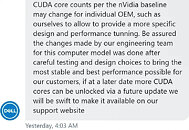- Joined
- Oct 9, 2007
- Messages
- 47,445 (7.50/day)
- Location
- Hyderabad, India
| System Name | RBMK-1000 |
|---|---|
| Processor | AMD Ryzen 7 5700G |
| Motherboard | ASUS ROG Strix B450-E Gaming |
| Cooling | DeepCool Gammax L240 V2 |
| Memory | 2x 8GB G.Skill Sniper X |
| Video Card(s) | Palit GeForce RTX 2080 SUPER GameRock |
| Storage | Western Digital Black NVMe 512GB |
| Display(s) | BenQ 1440p 60 Hz 27-inch |
| Case | Corsair Carbide 100R |
| Audio Device(s) | ASUS SupremeFX S1220A |
| Power Supply | Cooler Master MWE Gold 650W |
| Mouse | ASUS ROG Strix Impact |
| Keyboard | Gamdias Hermes E2 |
| Software | Windows 11 Pro |
Last week, it surfaced that Alienware shipped certain m15 gaming laptops with GeForce RTX 3070 Laptop GPUs with fewer CUDA cores than what is standard—4,608 vs. 5,120, without properly advertising it in their marketing material. Over the weekend, the company's train-wreck of a response played out. First, from Alienware's parent company Dell; and later by Alienware itself.
Dell, in a statement to Jarrod's Tech, tried to normalize the practice. "CUDA core counts per NVIDIA baseline may change for individual OEM, such as ourselves [Dell], to allow to provide a more specific design and performance tuning. Be assured the changes made by our engineering team for this computer model was done after careful testing and design choices to bring the most stable and best performance possible for our customers, if at a later date more CUDA cores can be unlocked via a future update, we will be swift to make it available on our support website," the Dell statement read.

Here's the controversy: Alienware did not advertise the specific configuration of the RTX 3070 Laptop GPU in this notebook, only mentioned the GPU name. One is guided to believe they are buying a notebook with a GPU they've independently researched to be of a certain configuration. Clock-speed tuning by OEMs to a certain degree is acceptable, but certainly not 10 percent fewer CUDA cores. Also, CUDA cores aren't the only things that are fewer. Since Dell/Alienware reduces the number of streaming multiprocessors available to the GPU, there are proportionate reductions in even RT cores (raytracing cores), Tensor cores, and TMUs.
Meanwhile, Dell's misfired attempt at damage-control was quickly eclipsed by Alienware, which trashed the "optimization" excuse offered by its parent company, and termed this as a manufacturing defect. The company released a statement to Tom's Hardware: "We have been made aware that an incorrect setting in Alienware's vBIOS is limiting CUDA Cores on RTX 3070 configurations. This is an error that we are working diligently to correct as soon as possible. We're expediting a resolution through validation and expect to have this resolved as early as mid-June. In the interim, we do not recommend using a vBIOS from another Alienware platform to correct this issue. We apologize for any frustration this has caused."
View at TechPowerUp Main Site
Dell, in a statement to Jarrod's Tech, tried to normalize the practice. "CUDA core counts per NVIDIA baseline may change for individual OEM, such as ourselves [Dell], to allow to provide a more specific design and performance tuning. Be assured the changes made by our engineering team for this computer model was done after careful testing and design choices to bring the most stable and best performance possible for our customers, if at a later date more CUDA cores can be unlocked via a future update, we will be swift to make it available on our support website," the Dell statement read.

Here's the controversy: Alienware did not advertise the specific configuration of the RTX 3070 Laptop GPU in this notebook, only mentioned the GPU name. One is guided to believe they are buying a notebook with a GPU they've independently researched to be of a certain configuration. Clock-speed tuning by OEMs to a certain degree is acceptable, but certainly not 10 percent fewer CUDA cores. Also, CUDA cores aren't the only things that are fewer. Since Dell/Alienware reduces the number of streaming multiprocessors available to the GPU, there are proportionate reductions in even RT cores (raytracing cores), Tensor cores, and TMUs.
Meanwhile, Dell's misfired attempt at damage-control was quickly eclipsed by Alienware, which trashed the "optimization" excuse offered by its parent company, and termed this as a manufacturing defect. The company released a statement to Tom's Hardware: "We have been made aware that an incorrect setting in Alienware's vBIOS is limiting CUDA Cores on RTX 3070 configurations. This is an error that we are working diligently to correct as soon as possible. We're expediting a resolution through validation and expect to have this resolved as early as mid-June. In the interim, we do not recommend using a vBIOS from another Alienware platform to correct this issue. We apologize for any frustration this has caused."
View at TechPowerUp Main Site





